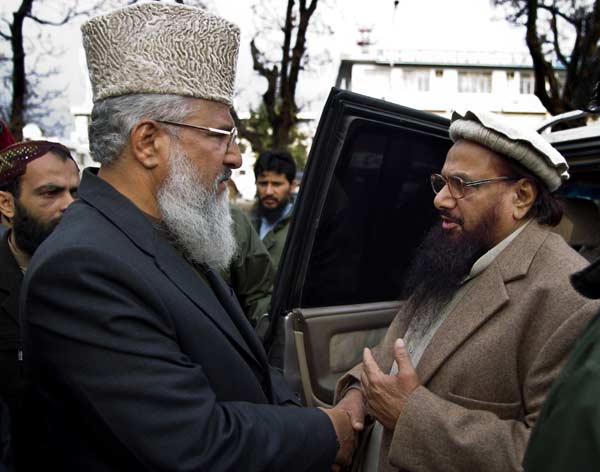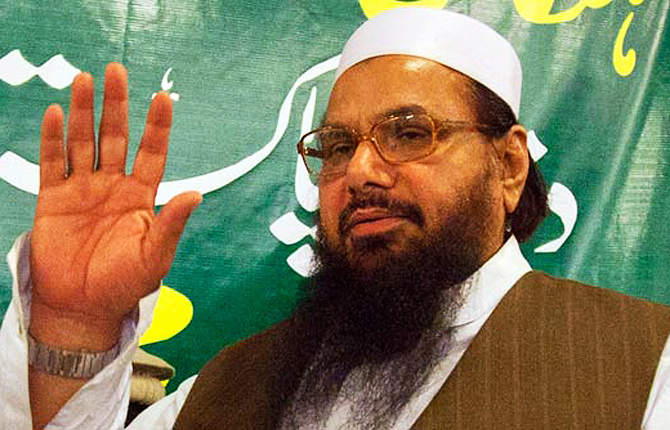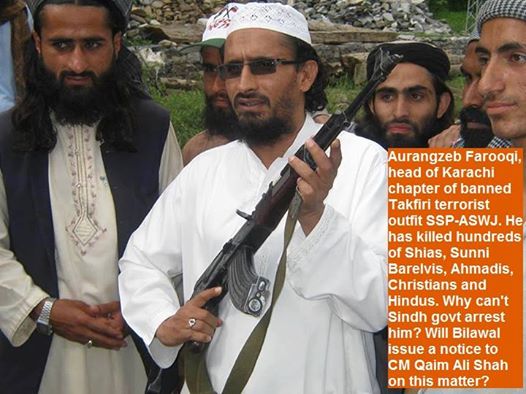BBC and Dawn: Pakistan’s extremist Deobandi and Salafi clerics support Saudi attack on Yemen
Clerics and leaders of organisations representing the Deobandi school of thought clearly ‘lauded’ the government policy that emerged after Defence Minister Khawaja Asif told parliament that Pakistan was ready to defend Saudi Arabia’s “territorial integrity at any cost” but had not yet decided to join Riyadh’s coalition fighting Yemen rebels.
“This is a welcome sign,” a statement from the Ahle Sunnat Wal Jamaat (aka Sipah-e-Sahaba aka LeJ) quoted its leader Allama Aurangzeb Farooqi’s speech before Friday prayers at Jama Masjid Khalilullah.
“Saudi Arabia has always supported Pakistan in the hour of need. The decisive action against Houthi insurgents has identified friends and foes in Islamic states.”
Same thoughts were expressed by Mufti Mohammad Naeem of Jamia Binoria Al Almia in the Site area. Also head of the Tehreek-i-Tahaffuz-i-Harmain Sharifain, Mufti Naeem said that the government decision reflected sentiments of every Pakistani. “To defend Harmain Sharifain is the duty of every Muslim,” he stated.
He said: “First the Houthis were used for bloodshed in Syria and now they have been centred in Yemen only to eye Saudi Arabia as their next target. At this hour the Muslims should unite with Saudi Arabia to defend Harmain Sharifain.”
Statements from Ahle Hadees Action Committee’s leader Syed Ashraf Qureshi and Syed Amir Najeeb also called the government announcement a ‘praise-worthy move’ that should be backed by every segment of society. They said this was not a sectarian dispute but a ‘battle against Islam’, which was needed to be defended by every Muslim. (Dawn, 28 March 2015)
According to BBC Urdu, Hafiz Saeed of Jamaat-ud-Dawa has announced public rallies in support of Saudi war on Yemen.
جماعت الدعوۃ نے سعودی عرب کی حمایت میں متفقہ لائہ عمل بنانے کے لیے کل جماعتی کانفرنس بلانے کا اعلان کیا ہے، اسلام آباد اور لاہور میں جمعہ کو تنظیم کی جانب سے السعود خاندان کی حمایت میں ریلیاں نکالی گئیں۔
لاہور میں جماعت الدعوۃ کے امیر حافظ محمد سعید نے ریلی سے خطاب کرتے ہوئے کہا کہ ’یمن میں باغیوں کو امریکہ اور اسرائیل کی حمایت حاصل ہے اور وہاں بغاوت کھڑی کرنا سعودی عرب کے گرد گھیرا تنگ کرنے کے مترادف ہے، اگر اس خطرے کو بھانپ کر سعودی عرب اور دیگر عرب ملکوں نے باغیوں پر حملے شروع کیے ہیں تو مسلم امہ کو ان سازشوں کے خاتمے کے لیے ایک ہوجانا چاہیے‘۔
ان کا کہنا تھا کہ پاکستان سمیت پوری مسلم امہ کو اپنے ملکوں سے زیادہ حرمین الشریفین کی فکر کرنی چاہیے اور سعودی عرب کے دفاع کے لیے کردار ادا کرنا چاہیے وہ سعودی عرب کے خلاف کسی جارحیت کو برداشت کرنے کے لیے تیار نہیں۔
All other Pakisanis of Sunni, Shia and liberal backgrounds oppose Pakistan’s participation in the Saudi attack on Yemen.
The Sunni Tehreek (Sarwat Qadri) and the Sunni Ittehad Council (Hamid Raza) asked the government to stay away from toeing any country’s line and make an effort for a peaceful resolution to the issue. They urged PM Nawaz Sharif not to sell Pakistan’s honour and neutral positin in return for Saudi Riyals.
Mainstream political parties including PPP, ANP, PTI and MQM too urged Pakistan PM Nawaz Sharif and Army Chief General Raheel Sharif to refrain from participating in Saudi attack on Yemen.
A large number of people attended a protest demonstration organised by the Majlis-i-Wahdat-i-Muslimeen on Friday in the Kharadar area of Karachi against the Saudi-led attacks on Yemen, warning the government that it should stay away from the kingdom’s policy that would affect harmony among the Muslims. The founder of Pakistan, Quaid-i-Azam Mohammad Ali Jinnah, as well as Allama Mohammad Iqbal had always condemned pro-imperialists monarchs of the Middle East and the Turkish regime, said the MWM leaders while addressing the protesters. “Innocent Yemeni civilians are being massacred brutally like Palestinians of Gaza,” said Mubashir Hassan of the MWM. “Sanaa, Saada and other parts of Yemen are being bombarded the way Zionist Israeli forces bombed Gaza. World silence against the war-mongers is a crime.”
سنی تحریک نے حکومت پاکستان سے مطالبہ کیا ہے فوج کو یمنی عوام کے خلاف جنگ میں نہ دھکیلا جائے، کیونکہ مسلم ملک کے خلاف فرقہ وارانہ مہمم جوئی کا حصہ بننا کسی صورت میں دانشمندی نہیں ہوگی۔
سنی تحریک کے سربراہ ثروت اعجاز قادری کا کہنا ہے کہ سعودیہ سے وصول کیے گئے ڈیڑھ ارب ڈالر کے بدلے حکومت قومی جذبات سے نہ کھیلے یمن، سعودی عرب اور ایران سمیت تمام مسلم ممالک سے پاکستان کو بلاتفریق دوستانہ تعلقات قائم رکھنا چاہیے۔ ان کا کہنا ہے کہ پاکستانی قوم پہلے ہی پرائی لڑایوں میں ناقابل تلافی نقصان اٹھا چکی ہے اور اب سعودی جنگ میں شمولیت سے ملک میں فرقہ وارانہ فسادت بھی چھڑ جانے کا اندیشہ ہے۔
یاد رہے کہ پاکستان پیپلز پارٹی ، عوامی نینشل پارٹی، ایم کیو ایم اور تحریک انصاف بھی سعودی عرب میں پاکستان فوج کو بہیجنے کی مخالفت کرچکی ہیں۔
مجلس وحدت مسلمین کے رہنما مولانا علی انور اور مولانا احسان دانش نے خطاب کرتے ہوئے کہا کہ ’سعودی عرب مشرق وسطیٰ میں اپنی لگائی گئی آگ میں خود جل رہا ہے، جہاں عوامی انقلابات نے آل سعود کی صدیوں سے جاری بادشاہت کا تخٹہ الٹ دیا ہے‘۔
ان کا کہنا تھا کہ ’موجودہ حکومت بیرونی امداد کے نام پر ملکی سالمیت کو داؤ پر مت لگائے کیونکہ اس سے پہلے بھی نوازشریف حکومت نے سعودی مراعات خود لیں جبکہ عوام اور افواج پاکستان القاعدہ، طالبان اور داعش کی صورت میں آج بھی دہشت گردی کی قیمت چکا رہی ہے‘۔
Source:
http://www.dawn.com/news/1172318/sectarian-polarisation-amid-air-strikes-on-yemen
http://www.bbc.co.uk/urdu/pakistan/2015/03/150327_pakistan_yemen_saudia_supporter_tk












The Saudi-led military campaign against the Houthis has led to fears of a burgeoning proxy war among the Middle East’s big powers. But it is unclear how, or if, Iran will directly respond to a campaign led by a coalition of Sunni nations against a Shiite militia force. Some Middle East experts caution that the Houthi rebels are hardly puppets of Tehran, and that Iran spent years largely ignoring the group’s struggles in Yemen.
Stephen Seche, a former American ambassador to Yemen, said that the Houthis had rarely defined their struggle in Yemen in sectarian terms and that their ties to Iran had been overstated by Gulf nations.
“The Saudis and the Sunnis have made this a sectarian issue,” he said. “This military campaign is the Sunni world saying to Iran: Get out of our backyard.”
Saudi officials argue that Iran has orchestrated the Houthi military advance so they can exert influence on yet another Middle Eastern capital and destabilize Saudi Arabia’s southern border. Adel al Jubeir, the Saudi ambassador to Washington, told reporters Thursday that there was evidence that Iranian Revolutionary Guard operatives and Hezbollah fighters had embedded with the Houthis. He called the military campaign a way to protect the Yemeni people as well as “a way of protecting our national interests.” But while Saudi officials welcome American support for the Yemen operation, they are keeping a wary eye on the United States’ interactions with Iran elsewhere in the region.
Leslie Campbell, the regional director of Middle East and North Africa programs at the National Democratic Institute, said that it was hard to ignore the notion that the Saudi-led offensive in Yemen was in part a message to the United States as it negotiates a nuclear deal with Iran and finds, to some degree, common cause with Iranian-backed Shiite militias in Iraq.
The message, he said, is “if you all want to make friends with Iran, have a good time; this is what you’re going to get.”
Few disagree that the continuing tumult in the Middle East has scrambled American priorities there. This has led many to argue that the Obama administration’s policy for the region is adrift — without core principles to anchor it.
But amid the confusion, some experts said that there cannot be an overarching American policy in the Middle East at the moment. The best the White House can do, they said, is tailor policies according to individual crises as they flare up.
“I would be more concerned if we had some sort of overly rigid policy,” said Barbara Bodine, another former American ambassador to Yemen who is now the director of the Institute for the Study of Diplomacy at Georgetown University.
“It is messy. It is contradictory. That’s foreign policy.”
http://mobile.nytimes.com/2015/03/27/world/middleeast/a-policy-puzzle-of-us-goals-and-alliances-in-the-middle-east.html?_r=1
LUBP, Pakistan’s alternative media, presents a critical archive on #Yemen https://lubp.net/archives/tag/yemen #YemenUnderAttack #SaudiArabiaInvadedYemen
ہمارے حرمین شریفین کیا سعودیہ کا شاہی خاندان ہے کیا
کیونکہ نہ تو کوئی حرمین کو نشانہ بنانا چاہتا ہے نہ ہی سعودیہ کی ایک انچ زمین پر قبضہ کرسکتا ہے
زیادہ سے زیادہ یمنی لوگ سعودیہ کی بادشاہت کو ختم کرکے وہاں جمہوریت لانا چاہیںگے
وہ بھی اس لیے کہ سعودیہ نے شروعات کی ہیں اور دخل اندازی کی ہے
اور السعود خاندان ہمیشہ سے حرمین کی آڑ میں اپنی وھابی حکومت چلاتا آیا ہے
آپ کا منہ اس وقت حیرت سے پھٹا کا پھٹا رہ جائیگا جب آپ دیکھیںگے کہ یہی پاکستانی فوج
جو سعودیہ کی دعوت پر وہاں جارہی ہے وہی پاکستانی فوج کچھ عرصے بعد امریکہ کے اشارے پر سعودیہ میں جمہوری نظام کی بنیاد رکھنے میں UNO کی مدد کریگی . کیونکہ UNO کو اسلامی ممالک کی فوجیں چاہئیے ہونگی تاکہ السعود خاندان عیسائی ممالک پر الزام نہ لگاسکے کہ وہ مکّہ اور مدینہ کو تباہ کرنا چاہتے ہیں وغیرہ وغیرہ
یہ کام جب شروع ہوگا جب سعودیہ یمن کے ایک لاکھہ سے زیادہ شیعہ اور سنی مار چکا ہوگا
اور سعودیہ میں خود خانہ جنگی شروع ہوچکی ہوگی اور پوری دنیا اس پے شور کر رہی ہوگی
السعود خاندان کی طرح سینکڑوں خاندان آئے اور گۓ اور سب سمجھتے رہے کہ وہ کعبہ کے محافظ ہیں. غلط ہے. کعبہ کا محافظ صرف الله ہے.
باقی سب اپنی حکومتیں چمکاتے رہے ہیں الله کے گھر کی آڑ میں